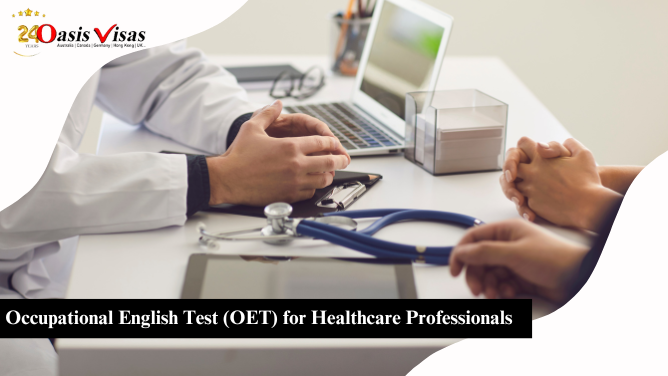
The Occupational English Test is an important test tool, especially for health professionals who want to practice in an English speaking background. It is widely accepted in many countries like the UK, USA, Australia, Canada, Ireland, New Zealand, and Singapore. Being a health professional, the Occupational English Test (OET) is a test intended to assess one’s understanding of the English language at all levels. This links the review to doctors, nurses, pharmacists, veterinarians, and other health professionals.
A Brief History of the OET
The OET was developed in the late 1980s, originally under contract to the Australian Government, by Professor Tim McNamara of the University of Melbourne. McNamara had experience with IELTS and thus designed this test for specific needs that were directly relevant to healthcare professions. What’s more, this test has seen continuous review and refinement by the Language Testing Research Center (LTRC) at the University of Melbourne in order to update its relevance and efficiency.
The Occupational English Test (OET) is now owned by Cambridge Boxhill Language Assessment, which is a joint venture of Cambridge English Language Assessment and Box Hill Institute. Such a partnership makes sure that the test remains updated and aligned with the most effective standards in language assessment.
Objectives and Structure of the Occupational English Test (OET)
OET is a tightly regulated assessment tool, designed to distinctly define the level of English language skills necessary for effective communication between healthcare professionals. The test, that has been under research and continuous practice for over 30 years, includes four test:
- Listening: This tests candidates’ understanding of spoken English in health related contexts through texts ranging from short workplace notices to longer talks.
- Reading: This involves reading written English with health-related articles and documents.
- Writing: This paper for the health profession encompasses writing activities for referral letters or other professional letters.
- Speaking: This test looks at the candidate’s capacity with respect to taking part in clinical conversation-making through role-plays and simulations around the healthcare profession.
Occupational English Test (OET) is available for the following 12 healthcare professions: Dentistry, Dietetics, Medicine, Nursing, Occupational Therapy, Optometry, Pharmacy, Physiotherapy, Podiatry, Radiography, Speech Pathology, and Veterinary Science.
Scoring and Recognition
Most health professional regulators would require a candidate to attain a C+ or B in all four papers. For instance, the General Medical Council (GMC) in the UK requires any doctor to attain at least a grade B in all papers, while the Nursing and Midwifery Council (NMC) requires one to attain a B in Reading, Listening, and Speaking, and a C+ in Writing. Importantly, the NMC allows candidates to combine scores from different tests taken within a period of five months. The OET is accepted by a great many professional regulators, educational establishments and employers in the US, UK, Canada, Australia, New Zealand, amongst many more.
How to prepare for the OET
The very first key to success is to improve your English for the Occupational English Test. Specialist Language Courses, as an established organization in this academic line of activity, provides tailored preparatory courses, helping health professionals to pass the exam. Have a go at the practice tests and targeted exercises provided with professional guidance and gain confidence, which naturally comes from competence. With a special focus on language skills and test strategies necessary, the SLC will dramatically improve your chances of achieving the required scores.
The OET Exam
These include most major cities around the world for OET test centers, both paper based and computer based. Directly in line with the COVID-19 pandemic, in 2021, OET introduced an at-home testing service. Therefore, this has given the chance for candidates not having a test center nearby to have the opportunity to attend their exam in the comfort of their own homes.
Consequently, Occupational English Test (OET) represents the critical gateway for international healthcare professionals seeking to practice their profession in English-speaking countries. It is this specialized approach toward medical English, as well as rigorous testing procedures coupled with wide application, that helps toward ensuring healthcare professionals provide safe and effective care across a wide variety of settings.











